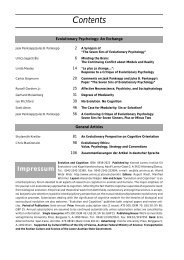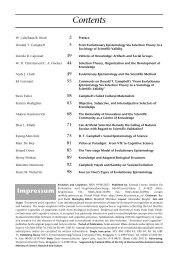Contents - Konrad Lorenz Institute
Contents - Konrad Lorenz Institute
Contents - Konrad Lorenz Institute
Create successful ePaper yourself
Turn your PDF publications into a flip-book with our unique Google optimized e-Paper software.
Some Perhaps Surprising Consequences of the Cognitive “Revolution”<br />
ing interest along with encouragement from<br />
behaviorists who treated evolution as legitimizing<br />
their dependence on cross-species generalizations<br />
and were deeply sympathetic with the ethology<br />
movement that was emerging among European zoologists<br />
(e.g. LORENZ 1937).<br />
The next two decades, however, show a precipitous<br />
decline in interest. In fact, evolution as a key<br />
term almost disappears from the scientific forum. In<br />
the 30 years from 1940 until 1969, the narrow scan<br />
yields a grand total of only 22 publications using<br />
evolution as a key term. Even in the broad scan, the<br />
number of publications drops by an astonishing<br />
75% from the decade of the 1930s to the 1940s. The<br />
gradual demise of behaviorism may have played a<br />
role here, but it is unlikely to have been the critical<br />
element. And, while the emergence of cognitivism<br />
certainly worked to delay the resurgence in adaptationist<br />
thought until the 1990s, it’s difficult to see<br />
how it could have had much impact in the post war<br />
era. Rather, the virtual abandonment of Darwinism<br />
during this period was primarily a reaction to an<br />
ever-deepening suspicion of adaptationist thinking—and<br />
for several good reasons.<br />
First, psychology was still struggling with its long<br />
and occasionally ugly history of exploiting adaptationism<br />
to draw invidious distinctions among peoples<br />
of differing ethnic and racial ancestries. The excesses<br />
of the eugenics movement and a recognition<br />
of the impact it had on immigration, education,<br />
health care, intelligence testing, and social policy<br />
(see HOTHERSALL 1995) was a compelling intellectual<br />
brake—especially when all of it was brought into<br />
horrific clarity by Nazism. And just when we began<br />
to hope we were over such embarrassments as GAL-<br />
TON’s (1874, 1880) and GODDARD’s (1912, 1917) arguments,<br />
works such as those authored by RUSHTON<br />
(1988) and HERRNSTEIN and MURRAY (1994) surfaced<br />
to show us again how treacherous this approach can<br />
be. The angry and combative reception that WIL-<br />
SON’s book Sociobiology (WILSON 1975) received is indicative<br />
of the strong feelings held by many (see,<br />
e.g., LEWONTIN/ROSE/KAMIN 1984).<br />
Second, evolutionary biologists such GOULD and<br />
LEWONTIN pointed out that the line between adaptation<br />
and exaptation was often a fine one. In their<br />
seminal “spandrels” paper (Gould/LEWONTIN 1979),<br />
they cautioned against drifting into a pan-adaptationism<br />
where all surviving organic features and behavioral<br />
propensities were assumed to have evolved<br />
because of particular adaptive roles in the species’<br />
past. Many adaptive forms and functions, they cautioned,<br />
exist today, not because they necessarily<br />
possessed singular utility, but because they “piggybacked”<br />
on other related forms and functions or<br />
were spandrels—that is, necessary consequence of<br />
the emergence of related structures.<br />
The result of these several forces was that Darwinism,<br />
so long the intellectual umbrella under which<br />
psychology flourished, was shunted aside like an<br />
embarrassing cousin. As the years went by it became<br />
increasingly clear that this was no small debt that<br />
was accumulating. Since its emergence as a distinct<br />
discipline, psychology had been codified, structured,<br />
and embodied within a functionalist’s frame<br />
of reference. DARWINISM had been the initial binding<br />
force that brought together the diverse elements<br />
of our science. Without DARWIN there would have<br />
been no basis for cross-species studies, there would<br />
have been no ethology, no physiological psychology,<br />
no comparative investigations. Individual differences<br />
would have been viewed as they were in<br />
HELMHOLTZ’s day, as annoying sources of error variance.<br />
Fields such testing and evaluation, assessment,<br />
diagnostics, indeed most of modern psychometrics,<br />
would have been reduced to little more<br />
than desperate attempts to declutter our data base.<br />
The mind itself would have been viewed as Titchener<br />
had naively counseled, an object whose structure<br />
was to be unpacked independent of any considerations<br />
of its functions. Emotions would have been<br />
seen as a compendium of modes of expression<br />
rather than as exquisitely evolved adaptations to<br />
the vagaries of an ever-changing environment—<br />
and no one would ever have wondered whether or<br />
why a nonhuman primate could behave deceptively<br />
(SEYFARTH/CHENEY 2002).<br />
The cognitive revolution, for all it did to free psychology<br />
from the shackles of behaviorism, actually<br />
worked against the emergence of adaptationist<br />
thinking. Indeed, it assisted in trussing up the field in<br />
a very different conceptual straightjacket. Enamored<br />
of information processing models, of computer simulations,<br />
of those clever theories in which so many<br />
boxes danced across the pages of journals and books,<br />
we found ourselves forgetting to ask the most basic<br />
questions: Do these models of mind make any DAR-<br />
WINIAN sense Could something like a language acquisition<br />
device, fully equipped with the contents of Universal<br />
Grammar have evolved within the time frame<br />
set out for it Do people really shunt information<br />
from one kind of memory store to another Did<br />
tightly encapsulated modules have any legitimate<br />
ontological status—did they have the requisite adaptive<br />
characteristics Could the mind/brain really<br />
have boxes labeled “input,” “sensory buffer,” “push-<br />
Evolution and Cognition ❘ 111 ❘ 2003, Vol. 9, No. 2








